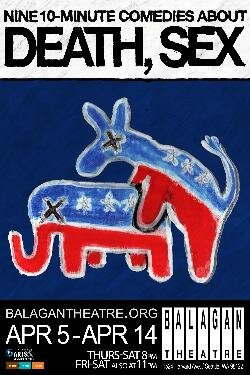Back in January Balagan Theatre produced a very brief run of the 2006 musical Spring Awakening. The production created tremendous buzz and promptly disappeared. Those of us not on the nose of every theatre trend have been granted a reprieve and Balagan has remounted that production (at Erickson Theatre through April 29) with some slight alterations in the cast. In its return the show proves remarkable, if a bit inconsistent.
Spring Awakening’s set-up, for those completely out of the know, is taken from Frank Wedekind’s play of the same name (written in 1892 but not performed till 1906) in which angst-riddled youth struggle against bourgeois repression. The events and their results in the original play still give pause today. Steven Sater’s adaptation softens and lightens Wedekind’s plot while still courting controversy. Most notable perhaps is Duncan Sheik’s score for the show, which set the stage for an assault on Broadway by rockers the likes of John Mellencamp, David Byrne, and fellow Sater collaborator, Serj Tankian.
The cast of Balagan’s Spring Awakening has been shuffled a bit since January. Tori Gresham now plays the sheltered Wendla. Bryan Gula, who previously played Otto, has taken over the central role of Melchior, an autodidactic wunderkind who teaches his fellow teenagers what their parents will not about birds, bees and the bourgeoisie. Kody Bringman does fine work taking on Gula’s former duties as Otto.
Gresham makes for a truly vulnerable and innocent Wendla flecked with a pentimento of animal urges. Gula manages to play his own vulnerability as well as the confidence and intellectual audacity that usually obscure it. Kirsten deLohr Helland, in the role of Ilse, may be the strongest actor and singer in the cast.
As Mortiz Jerick Hoffer is prone to a bit of overacting, coming off as a kind of Rupert Grint to Gula’s Daniel Radcliffe. However Hoffer deserves special notice for the strikingly original takes on his big numbers. While “I Don’t Do Sadness” is usually played as a hard punk-edged raging rock number Hoffer gives it a gentler more aching treatment that wants a cabaret act of its own.
This production’s greatest success lies in the clarity that director Eric Ankrim has brought to the plot. The complexities of Wendla and Melchior’s characters and their relationship are laid bare here giving definition to the glancing, almost abstracted lyrics. This is the key to the successful marriage of viable pop/rock songs and musical theatre.
In their duet, “The Word of Your Body,” there is a tension between the character development we’ve seen and that evinced by the lyrics. Melchior seems more innocent in song than his actions and the preceding scenes suggest while Wendla seems more worldly. That conflict brings the number into the present moment of wondering what will happen next and reveals contradictions that feel very honest.
Ankrim is less successful with Mortiz’s father, a hit-and-miss Mark Waldstein who plays all the adult men. In an Act 2 scene that needs little more than Duncan Sheik’s gorgeous “Left Behind” Ankrim clutters the number with business that bludgeons the audience with judgments that are inconsistent with the world of the story.
Less clear than the narrative is this production’s relationship with the audience. In the Broadway production some onstage audience seating helped to perforate the fourth wall and set up the Brechtian dualities of the staging. Chorus vocalists in street clothes were sprinkled amongst these seats. On the much smaller Erickson stage the seating feels more like it’s part of the house, turning the stage into a thrust. Unfortunately Ankrim stages this show in proscenium with only a rare acknowledgement of the “on-stage” audience. The chorus is left to pop up from behind masking flats like puppets who wandered over from Avenue Q.
A raised level upstage reinforces the proscenium experience and Ankrim lets the set get the upper hand. Occasionally he uses the upper level to great effect turning portions of the ensemble into audience or suggesting chapel structures. More often scenes are played only for the fixed seats of the usual Erickson house.
The choreography makes up in exuberance what it lacks in subtlety but seals the deal on “Totally Fucked.” The lighting is excellent as is the music direction. Props need some help, especially the rubbery-looking gun that doesn’t know where it wants to live and the switch. The stage combat also leaves a lot to be desired.
All told these are relatively minor distractions and opportunities for growth at Balagan. This is a solidly entertaining production of a lovely, sad and hopeful show. Flaws and all Balagan provides plenty of reason not to let Spring Awakening pass you by again.
